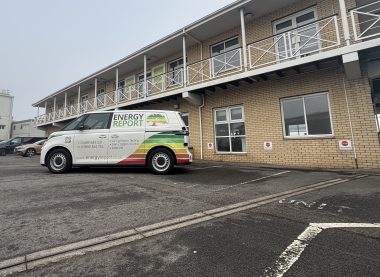Request a quote
Thanks for getting in touch
Providing an EPC rating of E or above for non-domestic properties has been a requirement since 2018. With over 15 years in the industry, our team can determine the energy efficiency rating of your building. Our accredited, non-domestic energy assessors can offer advice ahead of time and provide solutions to improve your results.
If your building doesn’t meet the required standard of an ‘E’, we are on hand to help you make sure your it meets Minimum Energy Efficiency Standards (MEES).

Why Do I Need a Non-Domestic EPC?
All non-domestic buildings require an EPC when sold or let. Additionally, to comply with the Minimum Energy Efficiency Standards (MEES) Regulations (2018), the property must have an EPC rating of E or above.
The EPC rating measures the energy efficiency of a non-domestic building. A good EPC rating is important for several reasons: firstly, it is required to meet MEES regulations for leasing; secondly, a poor EPC rating can impact the property’s market value; and thirdly, many banks and other funding institutions require an EPC before approving funding.

Our Process
If you need an EPC for a non-domestic property our team can help.
Calculating the energy performance of a building is a complex process. Our accredited assessors look at the type of construction of the building, function of each useable area within the building, the occupancy profile for each zone and which systems are used.
The EPC is broken down into a rating with a corresponding letter. Ratings for Non-Domestic buildings are based solely on CO2 emissions. To determine this, our assessors first carry out a site survey to gather information about the building before entering it into an approved software programme.
An EPC site survey will likely take between 30 mins and 4 hours dependent on the building size and complexity. On return to the office, our assessor creates a 3D energy model using specialised accredited software, performs the required calculations, and generates the EPC rating in line with current regulations.
If the building does not meet the minimum E rating requirement, simple improvement measures can be suggested. For more complex cases, or if the owner wants to future-proof the building for upcoming MEES regulations, a bespoke EPC Improvement Report (EIR) is recommended, outlining tailored solutions to achieve the desired rating.
What factors are considered in EPC calculations?
The mechanical and electrical (M&E) systems in a non-domestic building have a strong influence on the overall EPC rating. They should be the primary focus when looking to improve the rating quickly. Additionally, enhancing the building’s thermal properties, such as insulation and glazing can further contribute to a better rating.
What Should an EPC for a Non-Domestic Dwelling Contain?
As well as the energy efficiency rating, a non-domestic EPC must contain reference information such as the unique certificate report reference number, the address of the building, the date of issue of the certificate and details of your energy assessor.
FAQs
What is a Non-Domestic EPC?
A Non-Domestic Energy Performance Certificate (EPC) rates the energy efficiency of a commercial building. It’s required when a property is sold, rented, or newly constructed to demonstrate compliance with Building Regulations and provide transparency for buyers or tenants.
Which software do you use?
We use Design Builder for all buildings which has a DSM (Dynamic Simulation Modelling) module for more complex or bespoke designs ensuring accurate and compliant results every time
How long does it take to produce an EPC?
Once we receive the required information and complete the site survey, a Non-Domestic EPC is typically delivered within 1–3 working days, depending on project complexity.
How long is a Non-Domestic EPC valid for?
A Non-Domestic EPC remains valid for 10 years, unless significant changes are made to the building’s layout, services, or energy systems.
What information do you need to complete the EPC?
We’ll need:
- Floor plans and elevation drawings
- Building use and zoning details
- Heating, cooling, and ventilation system specifications
- Lighting and control information
- Construction build-ups for walls, floors, and roofs
Providing this data early helps ensure smooth and accurate certification.
What is considered a good EPC rating?
EPC ratings range from A (most efficient) to G (least efficient). Modern, well-designed commercial buildings typically achieve B or better, often helping landlords meet future MEES (Minimum Energy Efficiency Standards) requirements.
Can you provide both SBEM calculations and the EPC?
Yes, We provide SBEM compliance reports and EPCs together, ensuring the building meets both Building Regulations Part L requirements and marketing certification standards in one streamlined process.
Which regulation govern Energy Perfromance Certificates in the UK
The key regulation concerning Energy Performance Certificates in the UK is the Energy Performance of Buildings (England and Wales) Regulations 2012 – Non Domestic – a guide can be found here
Benefits
- Quick Quote
- Responsive Service – we will fit with your time scales
- Post survey advice– assisting you to meet MEES requirements
- MEES consultancy service
- Portfolio capabilities
- Nationwide Service
Associated Services
- EPC Improvement Report (EIR)
Book your Non-Domestic EPC today
We always welcome new projects so if you need a dedicated consultant, we are here to help. Contact us today to build a better future.
Request a quoteCall to Discuss





